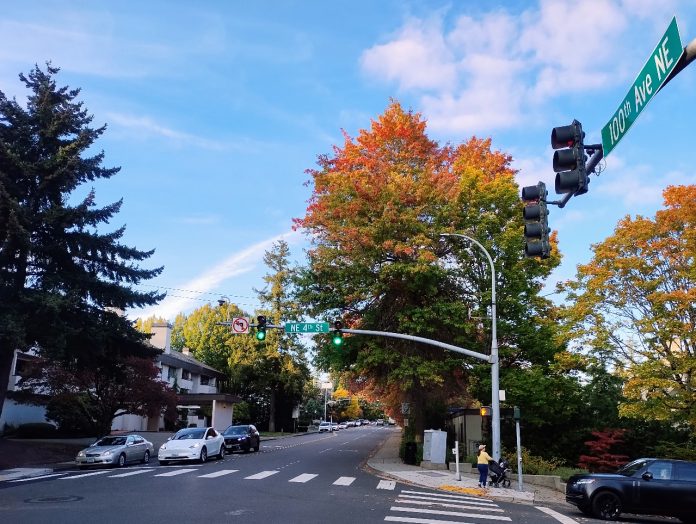
Bellevue is set to ax a planned 100th Avenue NE bike lane after facing opposition from Kemper Freeman Jr.’s firm.
The Bellevue Transportation Commission this month voted to recommend an alternative to a proposed protected bike lane that would have created a brand new north-south connection on the west side of Downtown Bellevue. Instead, the new proposal will route people on bikes to a detour blocks out of the way through a residential neighborhood, without a plan on the table for a safe route back toward downtown.
The commission’s move represents one of the final steps in the dismantling of the ambitious Bike Bellevue program over the course of 2024, after the Bellevue City Council directed the transportation department to reallocate car lanes in order to create bike or pedestrian facilities only “as a last resort.” After getting some flak, the council seemed to walk back their guidance in August.
The original Bike Bellevue proposal for 100th Avenue NE, a relatively minor arterial street that sees about 10,000 vehicles per day, was to create a two-way bike lane on the east side of the street, alongside the back of Bellevue Square Mall. The street currently has two northbound lanes, one southbound lane, and a center turn lane, and the volume of traffic on the street makes it a great candidate for a “road diet” under the standards laid out by the Federal Highway Administration, creating space for a bike lane. But mall owner Kemper Development had other ideas.
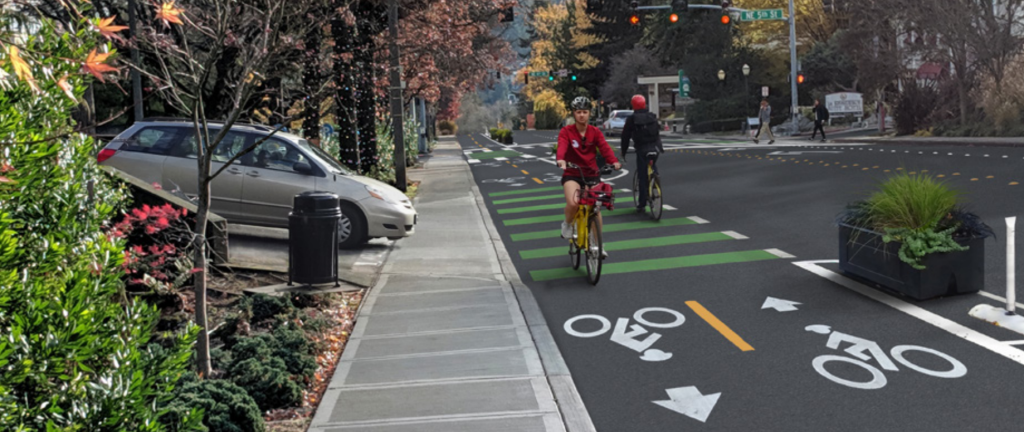
Kemper Development doesn’t just own and operate the mall, but also nearby Lincoln Square and myriad other properties in Downtown Bellevue. The portfolio has made its owner and CEO, Kemper Freeman Jr., a billionaire — and helped fund his sizable political donations to Republicans, including Trump.
The powerful real estate firm has been heavily involved in land use and transportation decisions in the city for decades, going so far as to sue to stop light rail from being constructed across I-90 in 2010. Kemper Development has been highly involved in the fight over Bike Bellevue, vocally pushing back on any attempt to reallocate street space from cars and trucks to improve safety and multimodal connectivity.
Emails obtained by The Urbanist show that the idea to re-route people on bikes actually came from the company, as well. Late this spring, Mariya Frost, Kemper Development’s director of transportation, met with Andrew Singelakis, Bellevue’s transportation director, and Kevin McDonald, the project manager in charge of Bike Bellevue. An email sent after the meeting spells out how Frost proposed using 99th Avenue NE, one block west of 100th, as an alternative route.
“Thank you again for taking the time to consider our thoughts on 100th and our proposed alternative at 99th. I hope we are able to find a solution for NE 8th to make that connection at 99th feasible, which would be a much safer and more enjoyable alternative N/S connection for cyclists,” Frost wrote.
Frost included the company’s private counts on driveway traffic for its garage entrances on 100th Avenue, in an apparent attempt to argue that volumes are too high for traffic to turn across a protected bike lane. Rather than embrace 99th Avenue NE as an alternative, the outcome of the meeting was an agreement to investigate 98th Avenue NE, another block west.
According to the emails, McDonald visited the site by bike shortly after, and on June 27, Frost wrote to ask how the ride went. McDonald replied positively, but noted that no plan existed to get back to 100th Avenue via NE 8th Street. The project manager appeared satisfied with “sharrows” — road markings that politely ask motorists to share the road with people biking — that the facility connects to toward the east.
“As a westward extension of the NE 1st Street sharrows that were recommended for east of 100th, the route is nice. Turning north on 98th, there is more of a hill and elevation gain than there would be on 100th going north, but it’s a nice route that anyone on a bike could take today and feel comfortable. Then at NE 8th St there is the problem of connecting back to 100th. To provide the Commission an option, I do think that we’ll need to find a design for 100th that accommodates bikes going north from 4th and south from 8th,” McDonald wrote.
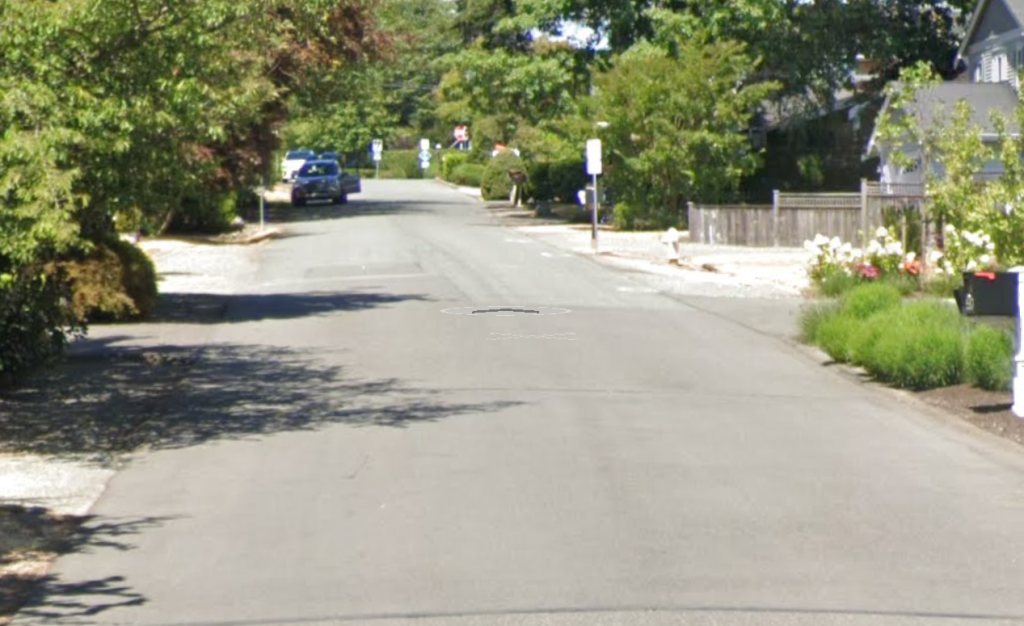
Moreover, McDonald made clear that he didn’t support the original Bike Bellevue plan for two-way bike lanes alongside Bellevue Square. “I do not like the two-way bike lane approach… I think directional bike lanes would be safer for all users,” he wrote.
McDonald was installed as Bike Bellevue’s project manager early this year, after its draft design concepts guide had already been released, taking over for Franz Loewenherz, the previous project manager. The ethics inquiry into Loewenherz’s behavior that led to the change in leadership centered in large part around Frost’s communications with the city on the project — ultimately, Loewenherz was found to have broken no city ethics rules or guidelines but was replaced anyway.
Despite the fact that no solution has yet been found to bridge the NE 8th Street gap, the Bellevue Transportation Commission voted 4-1 to advance the 98th Avenue NE alternative on October 10. That vote follows previous ones earlier this year that walk back the Bike Bellevue plan considerably, deferring work on critical corridors like 140th Avenue NE and most of Northup Way NE, reducing a bike facility on NE 2nd Street to sharrows, and taking any bike facility on BelRed Road off the table.
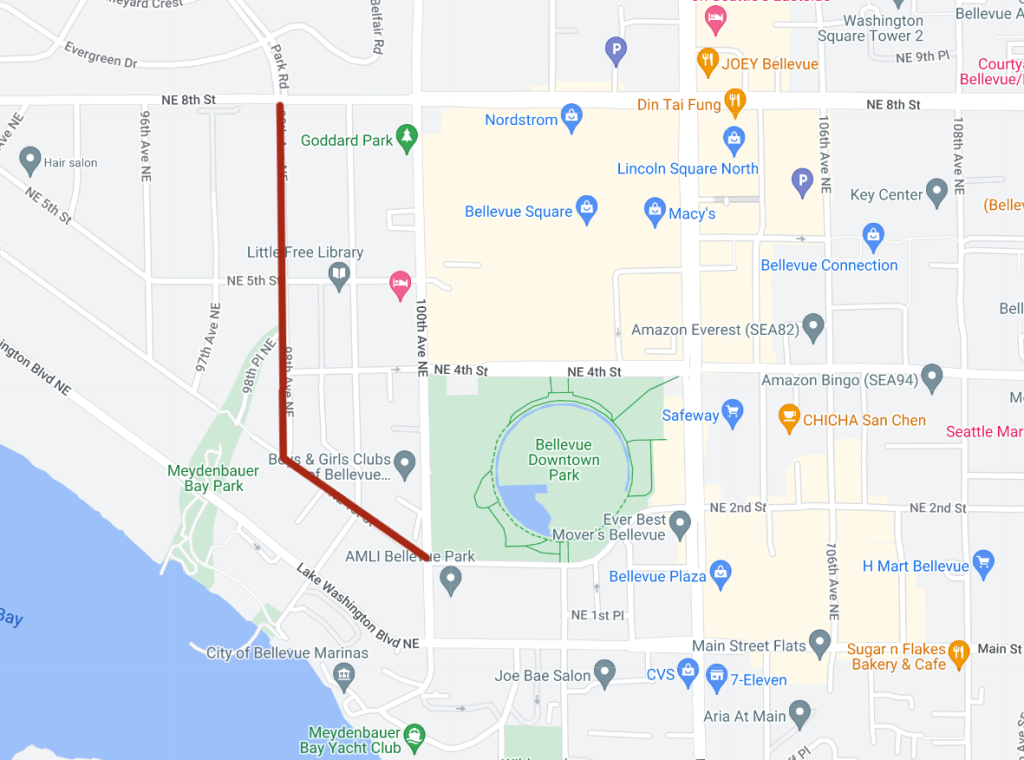
As they did in their conversation around BelRed Road, multiple transportation commissioners argued that creating a safer place to bike for people utilizing 100th Avenue NE would make the street more of a dangerous place by encouraging people to bike there.
One of the four votes opposing the two-way bike lane planned on 100th came from Susanna Keilman, appointed to the commission this summer. In 2022, Keilman was a Republican candidate for the Washington House of Representatives in the 28th Legislative District, which covers much of South Pierce County, challenging incumbent Dan Bronoske, a Democrat. During that race, Keilman’s campaign received $2,000 donations from Kemper Holdings, an offshoot of Kemper Development.
In explaining the reasoning behind her vote, Keilman noted that she had biked the route and ended up out-of-breath.
“I would rather take a safer route and have it be a little bit tougher on me and deal with that incline than to go [with] the path of least resistance, which isn’t always safe,” Keilman said. “When I think about drivers coming out of Bellevue Square parking garage and having to wait and be so cautious because they’re looking out for bikers, that’s going to create a backup and more carbon emissions of people are just kind of waiting in the parking garage to exit that property.”
Commissioner Albert Ting defended the idea of sending people on bikes out of their way and up a hill because of the existence of e-bikes.
“I understand that people are concerned about the detour, or the length, the grade, the steepness of the hill — the way that I look at it is Bellevue is a hilly place, and I believe that we can build bike lanes in hilly cities because of the fact that we have e-bikes and other technologies coming along,” Ting said. “So I do admit that it is a longer route, it’s a little bit of a detour, as some mentioned, but having an e-bike tickle up a hill, whether it’s on [this project] or a different part of Bellevue, I think, is a reasonable mitigation to the fact that Bellevue is a hilly city.”
The only commissioner present who opposed Kemper Development’s 98th Avenue NE plan was Jonathan Kurz, who pushed back on the idea that creating dedicated bike lanes would somehow be less safe.
“We have to consider the safety of people as they ride today, and for those people who do ride on BelRed [Road] and people who do ride on 100th, we should really try to make it safer for them. You know, this alternate route will always exist, but I just have a hard time seeing people — like, what, is it gonna be like a sign that says bikes go this way?,” Kurz said. “It seems like it’s not in the spirit of making our downtown bike friendly, right? Like we’re saying we don’t want bikes to ride across downtown, we want to go way over this way and down this way and stay out of the way.”
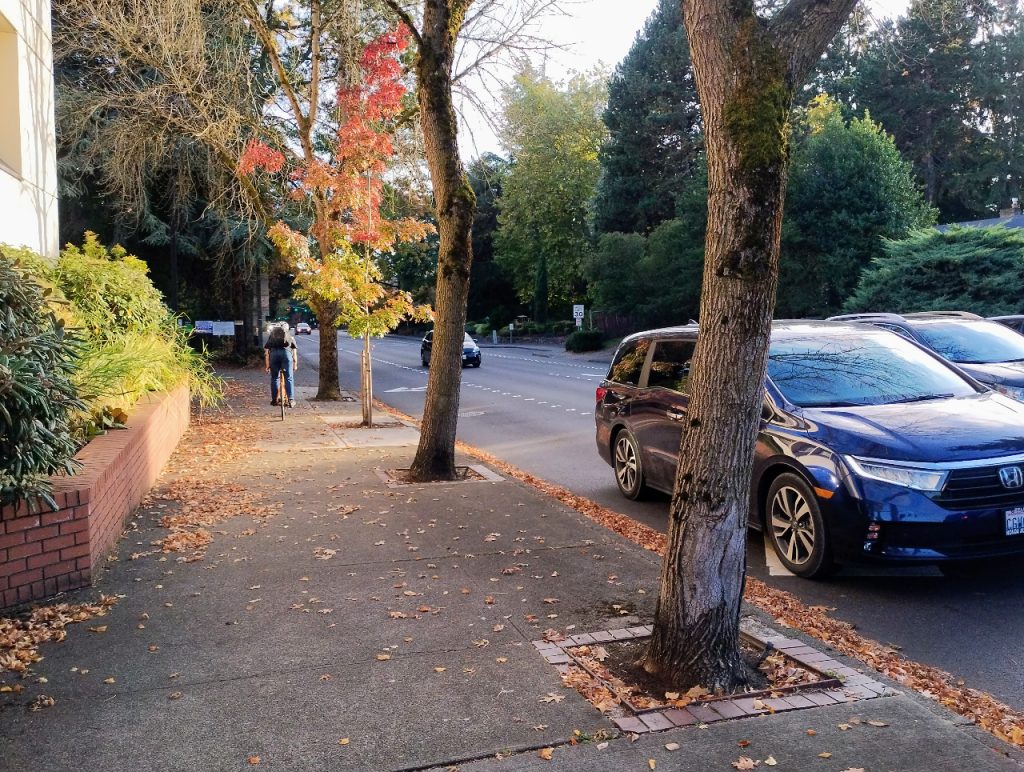
In response to an inquiry from The Urbanist, Mariya Frost provided Kemper Development’s perspective.
“After conversations with our Security Director and traffic team, City staff, and engaged residents, we shared serious safety concerns about routing bicyclists along Bellevue Square’s driveways on 100th, where over 1.6 million vehicles enter and exit each year,” Frost wrote. “Rather than advocating for the no-build option on 100th, we felt it was important to consider and pay for engineering analysis of adjacent streets that may help provide a safer connection for bicyclists. Staff indicated 98th would be a better option than 99th, as they have planned crosswalk enhancements at 98th to facilitate safe crossings across NE 8th, so that is what we chose to analyze and study for feasibility.”
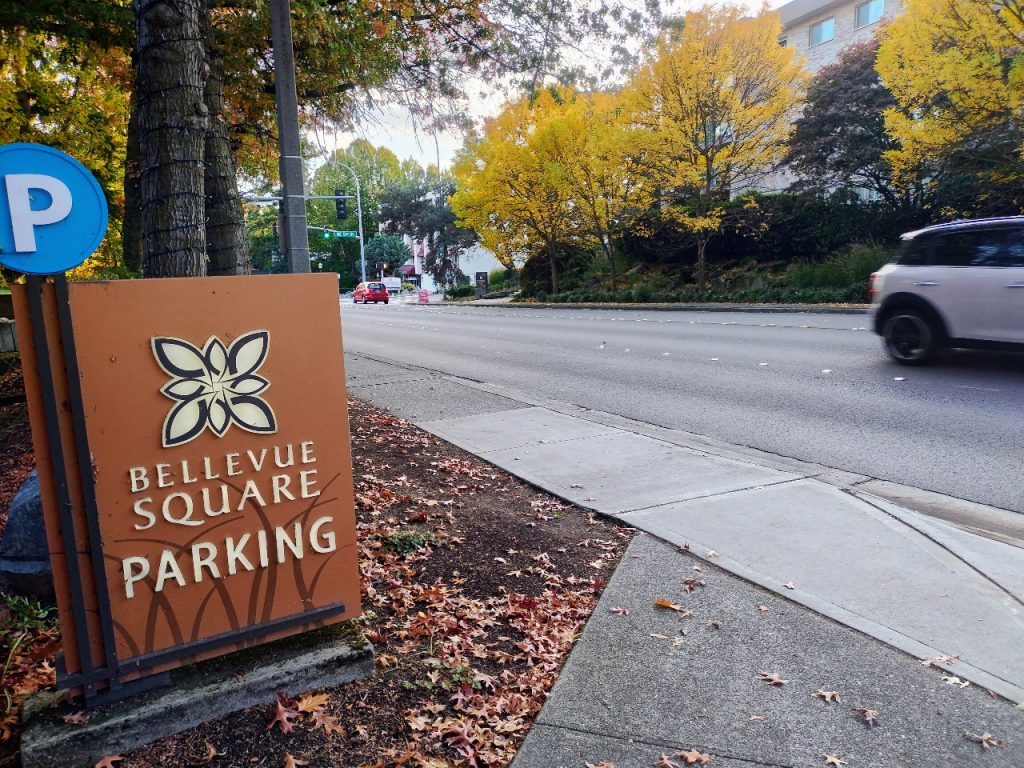
Frost admitted that some cyclists would continue to bike on the more direct route on 100th Avenue, rather than take the proposed detour.
“Experienced cyclists who choose to bike along 100th anyway are free to do that, but the City should not actively encourage that they do so in the presence of a much safer option,” Frost concluded. “If the City’s goal is to encourage bicycling among people of varying levels of experience and support safe travel behavior among all users of the transportation system – 98th represents the best alternative.”
Kemper Development’s hope is that the City can design a multipurpose path along the north side of NE 8th Street to connect back downtown, but McDonald noted that the idea had not been fully vetted by the city. “Our engineers in house haven’t really looked at it with any great detail yet, but depending on the recommendation that you provide, we would do that,” McDonald told the commission.
Bellevue residents may question whether their safe streets infrastructure is being designed by their own public civil servants or by Kemper Development, and the timeline of events here serve as a clear illustration of the degree to which the company has dominated the conversation around Bike Bellevue and the city’s Vision Zero plan. People forced to bike on a downtown bike network with numerous gaps in it will know who to thank.
This article has been updated to include additional information about a potential future bike connection on NE 8th Street.
Ryan Packer has been writing for The Urbanist since 2015, and currently reports full-time as Contributing Editor. Their beats are transportation, land use, public space, traffic safety, and obscure community meetings. Packer has also reported for other regional outlets including BikePortland, Seattle Met, and PubliCola. They live in the Capitol Hill neighborhood of Seattle.

